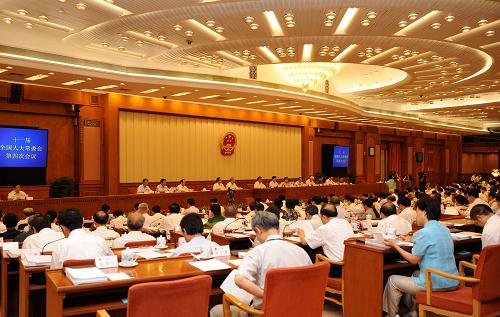Government officials with large assets from unidentified sources will face tougher penalties under the draft amendment of the Criminal Law that began making its way through China's top legislature on Monday.
The draft stipulates that government officials who can't explain the source of their assets will face a maximum jail term of 10 years, double the current penalty.
Retired officials, relatives and close friends of officials will also face criminal penalties if they take advantage of the officials' positions to get bribes or make improper profits, under the draft.
 |
|
The Standing Committee of the National People's Congress (NPC), China's top legislature, started a five-day session on August 25 to review draft laws and amendments on criminal law and food safety, among other issues. |
It was necessary to give heavier penalties to officials abusing their power for personal gain, as they were betraying the public interest, said Li Shishi, director of the NPC Standing Committee's Legal Affairs Commission, at Monday's meeting.
"It is necessary to give heavier penalties to officials and their intimates abusing power for personal gain, as they are betraying the public interest," Li said.
The offence of holding unexplained assets was first determined in 1988 by the Standing Committee of the National People's Congress (NPC). Under the 1997 Criminal Law, people who can not explain the source of their assets face up to five years in prison.
Yin Guoyuan, former deputy director of the Shanghai municipal housing, land and resource administration bureau, was charged with taking bribes and holding unexplained assets of more than 8 million yuan earlier this month.
The maximum five-year jail term was too light to punish corrupt officials and deter corruption, said Professor Ma Huaide, of the China University of Political Science and Law.
Legal experts said some corrupt officials refused to reveal the sources of their assets after being caught. The money would be classed as unexplained assets rather than bribes, incurring lighter penalties compared with charges of graft and bribery, which have a maximum sentence of death.
"The revision to a maximum ten-year sentence aggravates the punishment and distinguishes it from graft and bribery," said Li Shishi, director of the NPC Standing Committee's Legal Affairs Commission.
"Judicial authorities shall also spare no effort in investigating suspected graft and bribery cases," Li said.
NPC member Zhang Wenxian said at the first session of the 11th National People's Congress in March that people around officials had been increasingly found participating in graft and corruption crimes.
The Standing Committee of the National People's Congress (NPC), China's top legislature, started a five-day session on Monday to review draft laws and amendments on criminal law and food safety, among other issues.
It will not be known until Friday whether the draft of the Criminal Law will be adopted.
(Xinhua News Agency August 26, 2008)